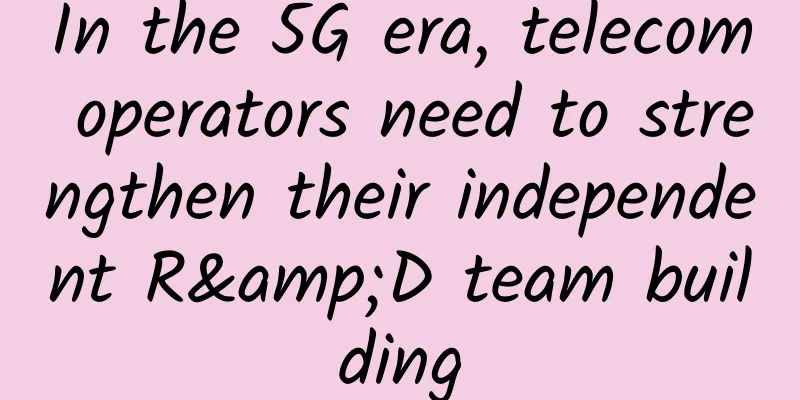In the 5G era, telecom operators need to strengthen their independent R&D team building

|
No matter which century it is, talent is always the most precious. The most fundamental thing in business management is human resources, and the most difficult and effective part of business management is human management. Especially the management of middle-level managers and core backbone personnel. Without excellent talents, no matter how good the goal concept is, it will be illusory, and no matter how much money is, it will only be a legend. Especially for communication companies that are about to enter the 5G era, the importance of talents is even more prominent. However, for communications companies that are in the midst of a comprehensive reform shift, the problems in talent team building are becoming increasingly prominent. Whether or not they can effectively compete for more young and energetic talents determines the next level of development for communications companies. This article explores this topic from the perspective of some of the current human resource issues in communications companies. Telecom operators are no longer popular As the saying goes, "Thirty years on the east side of the river, thirty years on the west side of the river", for college graduates, telecom operators used to be a place they wanted to get into, but it was difficult to get in. From group companies to provincial, municipal and even county-level companies, they once absorbed outstanding graduates from major domestic universities. However, with the rise of Internet companies and innovative start-up companies, although telecom operators still seem to be a good place to work, they are no longer the most popular place for college graduates to work. According to statistics from the campus recruitment market, the attractiveness of telecom operators to college graduates has been weakening year by year. According to the 2018 employment quality report of various universities cited by NetEase News, among the companies that students from 985 universities like to work for, China Mobile ranks 14th, China Unicom ranks 42nd, and China Telecom is not on the top 44 list. Although there are still two major telecom operators on the list, the number of people admitted by China Mobile and China Unicom is obviously too small, which is still far from the actual demand. If this situation continues, it means that telecom operators may not be able to effectively replenish the fresh "blood" needed to maintain their competitiveness in their subsequent development, especially in the 5G era. The exodus of outstanding talents and the aging of the workforce are showing a growing trend I remember that the October 2014 issue of China Telecom Industry discussed the stability of the telecom operators' workforce with the topic "Why did they leave? - A sober reflection on the resignation wave". More than four years later, we look back at this issue and find that telecom operators still face two prominent problems in terms of talent. On the one hand, in addition to the fact that the tower company continued to attract and divert some key personnel after its establishment, more core talents from telecom operators left for Internet companies or joined the "mass entrepreneurship" trend. This mainly caused the resignation of core talents and even some middle and senior management personnel. In recent years, there have been frequent reports of middle and senior management personnel at the telecom operator group level leaving for other companies. At the same time, coupled with the superposition of other factors, the already low morale of the telecom operator team has been further adversely affected. On the other hand, when comparing the turnover rate of telecom operators with that of other major similar industries, the former is significantly lower. Although the trend of talent leaving operators has emerged, the voluntary turnover rate is still relatively low compared to the size of the telecom operator team. Compared with the active turnover rate, the passive turnover rate is an indicator that shows that telecom operators have a low rate of active employee elimination due to employment methods and actual management concepts and thinking methods. This is bound to lead to a more prominent problem of aging of the staff structure when fresh blood cannot be effectively replenished. This also has a significant crowding-out effect on labor costs. Moreover, this crowding-out effect, under a one-size-fits-all management model, can easily cause telecom operators to crowd out the labor costs of market-oriented companies in terms of innovative business, which in turn constrains market-oriented companies. In recent years, telecom operators have generally been experiencing low revenue growth and have been under great pressure to meet overall operating performance indicators, which seems to mean that work related to the allocation of labor cost resources has reached a deadlock. It seems that it is difficult for telecom operators to effectively promote the comprehensive and in-depth reform of the personnel team in the conventional way. Analysis of key factors of human resource issues in telecom operators Common reasons for leaving include: (1) lack of room for growth; (2) personal health or family reasons; (3) joining the ranks of innovation and entrepreneurship; (4) high workload and mismatched pay; (5) dissatisfaction with the work atmosphere or environment; (6) incompatibility with superiors and inability to change, etc. These reasons are mostly common and do not vary greatly depending on the level of the employee. In Jack Ma's words, there are two reasons: one is that the money was not enough; the other is that I was wronged. The combination of the two is aggrieved. The above reasons can be summarized as the dual key factors of internal and external factors: 1. External key factors: There is no harm without comparison. Enterprises in related industries have done a relatively good job in terms of salary and welfare benefits, especially the treatment of leading Internet companies and some emerging industry entrepreneurship and innovation companies, which are far more attractive than telecom operators in terms of salary and benefits. 2. Key internal factors: For many years, the overall salary of telecom operators has not increased enough, and they lag behind other related industries. In addition, the lack of specific internal human resource management will aggravate the deterioration of human resource problems. The author believes that the internal human resource management mainly includes: One is the employment model that relies too much on outsourcing. In terms of operation, there are two main types of outsourcing: headcount outsourcing and business outsourcing. The result of over-reliance on outsourcing is that the requirements of staffing control are met in name, but in reality the human resource-related costs paid have not been reduced, and the labor employment risks have not been effectively reduced. Money has been spent, and a lot of it has been spent, but this is not conducive to the construction of one's own talent team, especially the reserve and capacity building of technical R&D talents. For enterprises that increasingly rely on technology, a research and development team with sufficient technical capabilities and considerable scale is the key to high-quality development. In the outsourcing model, outsourced personnel lack a basic sense of identity and belonging, and have poor stability. The ability and experience accumulation of the outsourced team will be lost with the end of the outsourcing project. Recruitment through outsourcing is becoming increasingly difficult, which is not conducive to the accumulation of core technologies. At the same time, the problems caused by the outsourcing model in the procurement process and actual management are becoming more and more prominent. Therefore, the excessive reliance on the outsourcing model seems to have solved the staffing problem, but in fact it has caused greater waste of human resources. Second, market-oriented human resource allocation has not been fully utilized. In the telecom operator system, whether it is the base company model or the professional company model, these market-oriented companies can actually sign contracts in accordance with market-oriented employment methods. Hiring and dismissal can be very flexibly carried out in a market-oriented manner according to business development needs. However, under the traditional employment system of telecom enterprises, it is very difficult to actively eliminate and dismiss employees. As for how to adopt more market-oriented employment methods to improve the structure and proportion of the company's own talent team, there has been no major push to carry out this work. Suggestions for Optimizing Human Resources for Telecom Operators Based on the above analysis, the author's suggestions for optimizing the human resources of telecom operators are as follows: 1. Based on the principle of substance over form , the business costs that are excessively used for outsourcing personnel should be returned to their essence and made explicit, and part or even most of the costs should be gradually used to supplement the talents of key positions. Only in this way can the gap caused by labor cost restrictions be narrowed under the pressure of internal and external employment. 2. In the case that the current traditional human resource management model cannot be effectively adjusted , we should increase the allocation of labor costs to various holding subsidiaries that have mature market-oriented operations, and build a team with a high technical level through the firewall isolation mechanism of holding subsidiaries. This is a channel worth actively exploring for telecom operators to supplement young and dynamic key technical talents in the 5G era. At the same time, we actively promote the rotation of some key personnel from group companies, provincial companies, etc. to market-oriented companies for human resource management, so that these human resource managers can participate in more market-oriented companies to accumulate front-line experience. 3. Explore the recruitment methods of non-telecom enterprise staff and gradually optimize them, so as to establish a mechanism that can actively eliminate staff more efficiently. This is particularly important for optimizing the existing talent team structure. In summary, for telecom operators, as they are about to enter the 5G era, in the competition for talent, if they cannot effectively supplement fresh "blood" represented by key technical positions, it will be difficult to make breakthroughs in high-quality development. Because, first of all, the talent is restricted by upstream and downstream enterprises in the industry. To supplement and optimize the young new forces, the holding subsidiaries have more flexible and market-oriented employment forms, which is a very important supplement and needs to be considered to be utilized more vigorously. |
<<: What stage has IPv6 reached now? How to upgrade to IPv6?
>>: 5G concept is being hyped, operators should not be too greedy
Recommend
The Ministry of Industry and Information Technology has launched a special campaign on IPv6. What should IDC, CDN and cloud service providers do?
On November 25 last year, the European RIPE NCC m...
Benefits of 5G for IoT
While IoT devices aren’t the ones that will benef...
ColoCrossing US VPS 50% off/Bare Metal Cloud 35% off, $1.97/month-1GB/25G SSD/20TB@1Gbps
ColoCrossing Easter promotion has started, with 5...
[Christmas] Unesty VPS 50% off, €2.1/month-AMD Ryzen9/2GB/50G NVMe/1Gbps unlimited traffic
Unesty is a German hosting company founded in 201...
Better connections enable faster, more flexible networks
For the past two decades, network architectures h...
[Restock] Bricklayer Los Angeles CN2 GIA (DC6/DC9)/Japan Softbank special price $46.6/year
Bandwagonhost has restocked the special annual pa...
10gbiz: Hong Kong/Los Angeles CN2 GIA line VPS 40% off $2.36/month, Hong Kong/Japan dedicated server 15% off first month starting at $27.43
10gbiz released a September discount plan, provid...
Have you fallen for the rumors and scams about 5G?
Since the birth of mankind, cutting-edge technolo...
China Mobile's 10-year old users will enjoy four major privileges. Netizens: How can China Unicom put its face?
For a long time, the relationship between the thr...
Discussion | Technical advantages of the top 9 leading SD-WAN providers abroad
SD-WAN technology helps make wide area networks m...
As work-from-home increases, so do attacks on VoIP and unified communications
As companies have shifted to a work-from-home mod...
Who knows? OSPF routing protocol is enough to read this article!
After the release of the interesting routing seri...
F5 creates “applications that are aware, controllable, and adaptable” to help enterprises achieve extraordinary digital experiences
On December 16, 2020, F5 held an online press con...
Sending Messages - RocketMQ Knowledge System (II)
[[410032]] In the previous article, we got to kno...









